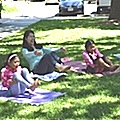- By Heather Zimar
- Around Town
 Print
Print  For five weeks this summer, approximately 45 youth from the SIFE (Students with Interrupted Formal Education, mostly Burmese refugees) and West Village after school programs have joined together for Cornell Cooperative Extension’s 4-H Urban Outreach program. Supported by an Ithaca Public Education Initiative (IPEI) Community Collaboration Grant, the program focuses on literacy, multiculturalism and special interest activities.
For five weeks this summer, approximately 45 youth from the SIFE (Students with Interrupted Formal Education, mostly Burmese refugees) and West Village after school programs have joined together for Cornell Cooperative Extension’s 4-H Urban Outreach program. Supported by an Ithaca Public Education Initiative (IPEI) Community Collaboration Grant, the program focuses on literacy, multiculturalism and special interest activities.“We’re really helping students to avoid that learning loss that happens over the summer,” said 4-H Urban Outreach Coordinator Suzie Schlough.
The enrichment program is an extension of the 4-H Urban Outreach afterschool program that takes place at Belle Sherman Elementary School and West Village Apartments during the academic year. The summer activities are based downtown in donated space at the First Presbyterian Church and follow morning classes at Beverly J. Martin Elementary School. Participating students attend kindergarten through fifth grade at Belle Sherman and Cayuga Heights Elementary Schools.
“The cultural immersion is wonderful,” said 4-H Urban Outreach Program Manager Jamila Simon. “It’s a wonderful socialization opportunity for both our programs. It’s great for the kids to get downtown. Families who participate emphasize their desire for their kids to get out of the isolated West Village.”
A key component of the program is literacy education, as many of the participants are English for Speakers of Other Language (ESOL) students. Each day begins with an hour of reading and writing, followed by a themed activity. During the week dedicated to emotional intelligence, for example, students practiced yoga with a volunteer instructor in DeWitt Park and made stress balls out of balloons and dried beans. As students pushed beans into rubber balloons, Simon asked them, “When can you use your stress balls?”
The students responded: “When you’re mad; when you’re sad; and when you’re angry.”
“You can also use them when you are trying to listen and focus on someone talking,” Simon added.
Other weekly themes include friendship, multiculturalism, science and technology, and performing arts. The program meets New York State 4-H mission mandates, which promote Science, Technology, Engineering, and Math (STEM), healthy living, and civic engagement. Academic support and social and life skills are emphasized during each activity. One day, for example, a group of students played BINGO, a game which Simon used to reinforce listening skills before an outside relay race. “We listen carefully to avoid getting hurt,” Simon told the near-silent students as they placed game chips softly on their number cards.
“Everything we do is connected to life skill,” said Schlough. “We offer a safe place to be with really positive adults.” “The rules apply to expectations for how students interact here, at home, and at school,” Simon added.
Students also participate in “clubs,” which are created by the program’s four senior counselors who design and plan the curriculum and activities, with input from students. This summer’s clubs are focused on acting, science and adventure, health and wellness, and music and culture. Participants gain hands-on experience in a range of subjects, from Latin American dancing and volcano-making to theatre performance and fire safety. “Our program emanates from the needs of our youth,” Simon added. “We use a life skills development model so we always provide options. Students get a choice of activities. They get the opportunity to engage in activities and the responsibility to see them through.”
David Li, a Cornell University engineering student and senior counselor, directs the health and wellness club in which students learn how to play Frisbee, baseball and run obstacle courses. He teaches the benefits of healthy eating, exercising and hydration. “I didn’t know that teaching could be this rewarding or fun,” said Li. “I like how we enhance the learning of the kids. It’s helping other people succeed, and my work makes a difference. I’m also gaining a lot of planning experience.”
“This program is a great way for counselors to develop their own leadership skills,” Schlough said, noting that each attends a week-long training in program expectations, culture competency, planning and teamwork. “They’re not just winging it.”
Schlough added that counselors often return for multiple years, fostering strong mentoring relationships. Samara Selden, a recent Cornell University graduate, is one of these mentors. She worked as a 4-H Urban Outreach summer and afterschool counselor for three years while attending school as a psychology major. She stopped in to say hello to students as they made stress balls.
“I did this for the kids,” she said. “They’re really fun, and you get attached. It’s pretty cool that they meet people from all over town. They get to be downtown and see Ithaca from a different angle.”
Simon said feedback from parents and Ithaca City School District (ICSD) teachers has showed the program has a positive impact on students academically and socially.
“It’s a wonderful opportunity,” she said. “I wish it was longer.”
The 4-H Urban Outreach summer program is one of two IPEI Community Collaboration Grants awarded since last September. In 2012-13, IPEI awarded 106 grants totaling $81,867, including 30 Teacher Grants ($39,838), 73 Red and Gold Grants ($32,129), two Community Collaboration Grants ($4900) and one grant for an emerging opportunity ($5,000). In addition, the Fine Arts Booster Group (FABG), an IPEI affiliate, awarded 18 grants totaling $9,515; and IPEI allocated $60,218 for the Kids Discover the Trail! program.
v9i28



